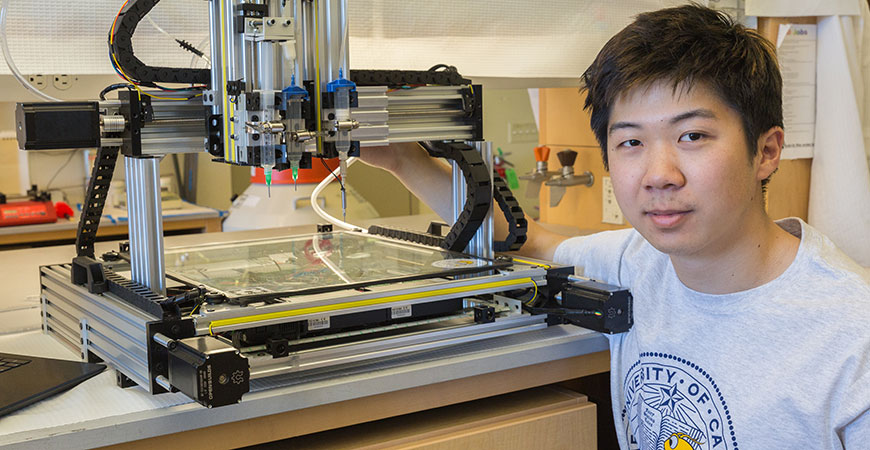
You could almost say Edwin Shen was destined to become a bioengineer. His mother, a medical doctor, practices pathology in Northern California, and his father retired from a career as a mechanical engineer for medical device companies.
“I guess what I do is right in the middle of my parents’ occupations,” he said. “Bioengineering was something my dad recommended I try. I thought research might be something that aligned well with my personality. It turned out to be a perfect fit.”
Shen, from Los Angeles, earned a bachelor’s degree in bioengineering from UC Merced in 2014 just three years after arriving on campus. He pursued a Ph.D. in Biological Engineering and Small-Scale Technologies — now known as the Materials and Biomaterials Engineering Graduate Group.
Professor Kara McCloskey said Shen was a top-performing bioengineering undergraduate student and his outstanding problem-solving and writing skills made him an excellent candidate for the graduate program.
His research in McCloskey’s research laboratory focused on two projects. One was the differentiation of human stem cells into a vascular cell type called a vascular smooth muscle. The second was addressing the lack of complexity and affordability in current bioprinting devices.
For the latter, Shen designed a multi-material bioprinter with novel features that improve resolution and embed hydrogels with concentration gradients of small molecules. He printed fragile induced pluripotent stem cells (iPSC), which are well-known for their propensity to self-assemble into tissue and demonstrate their high viability in long-term printed culture. He guided these iPSC toward vascular smooth muscle fate through fluorescently activated cell sorting and optimized cell culture conditions.
As a graduate student, Shen was awarded a National Science Foundation’s Innovation Corps (I-Corp) grant with McCloskey, fellow UC Merced graduate student, and now alumna, Rachel Hatano, and Elliot Botvinick from UC Irvine to investigate the commercialization potential of the bioprinter he developed. The grant provided them with funds for an immersive, entrepreneurial training program that facilitates customer discovery to see if the product is viable for industry.
“We went through the program and got entrepreneurship training, but ultimately it felt like industry was not ready for what our product could offer. They wanted us to modify the system for reproducible cell culture plating — something much simpler,” he said. “Building my own bioprinter got me acclimated to programming and hardware machinery. A lot of the process development I do now deals with things like automation and troubleshooting machines.”
After earning his Ph.D. at UC Merced in 2020, Shen spent a year at a startup company in San Diego performing upstream process development — the optimization of cell culture manufacturing for drug production and quality.
He now works as a senior scientist for Pfizer.
“I have been using the engineering skills I learned from my bioprinting days at UC Merced to build software for custom automation and advanced bioreactor controls at Pfizer,” he said. “I’m involved in exciting initiatives where I create new bioreactor control strategies, then realize these strategies in live experiments with my custom automation tools.
“Ultimately, my work in upstream process development here at Pfizer will contribute toward the manufacturing of drugs such as antibody therapeutics.”
McCloskey is thrilled with Shen’s success.
“I love to hear how my students land up in excellent careers and, especially, that the training from our programs at UC Merced was relevant to their career goals,” she said.
Shen said he is happy that he discovered his career path at UC Merced.
“I was really impressed with how beautiful the campus was, which is why I chose UC Merced,” he said. “I stayed for grad school because I was impressed by the caliber of the faculty at UC Merced. And my training at UC Merced gave me a strong quantitative background with skills in cell culture and software development to tackle challenges in my current role.”
My training at UC Merced gave me a strong quantitative background with skills in cell culture and software development to tackle challenges in my current role.
Brenda Ortiz

Senior Public Information Representative
Office: (209) 228-4203
Mobile: (209) 628-8263






